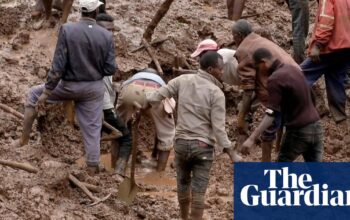
The high court in London has ruled that thousands of Nigerian villagers have the right to file human rights complaints against Shell, a fossil fuel company, for the ongoing contamination of their water sources and disruption of their livelihoods.
This week, Mrs Justice May declared that Shell can face legal action from over 13,000 farmers and fishers in the Niger delta’s Ogale and Bille communities for violating their right to a healthy environment.
The court determined that the pollution may have violated the villagers’ right to a clean environment as outlined in the Nigerian constitution and the African charter on human and people’s rights. Any claims made based on these rights have no time limit.
Shell said its Nigerian subsidiary, the Shell Petroleum Development Company of Nigeria (SPDC), accepted responsibility for the spills it caused and compensated affected parties where required by relevant Nigerian regulations. It said it also remediates all spills from its assets, regardless of cause. Shell plc denies that it owes a duty of care directly to the claimants.
Shell responded to the ruling by stating that the plaintiffs were unable to pinpoint the specific spill or spills that allegedly led to the damage, despite being instructed by the court to do so.
Matthew Renshaw, the international team partner at Leigh Day, which is representing the villagers, said: “This ruling is a significant moment in the eight-year battle by the Ogale and Bille communities to get Shell to take responsibility for the oil pollution that has blighted their land.
“Throughout this period, Shell has consistently utilized technicalities in an attempt to hinder and prolong the process of our clients’ claims. According to the Nigerian Constitution, Shell can no longer argue that it is not responsible for the pollution as it occurred over five years ago.”
Renshaw stated that they are looking to swiftly progress towards a trial where their clients’ demands for complete restoration and reparation for the devastation of their livelihoods can be fully addressed.
In a unanimous decision three years ago, the supreme court determined that Shell plc (a UK parent company) could be held legally accountable for the pollution caused by its Nigerian subsidiary.
However, the situation has persisted with ongoing legal disputes between Shell and the plaintiffs.
The latest ruling was commented on by a representative from Shell who stated, “We have strong confidence in the validity of our argument. In the Niger delta, there is widespread theft of oil happening at a large scale. This illegal activity contributes greatly to pollution and is responsible for most of the spills in the Bille and Ogale areas.”
Overlook the promotional newsletter offer.
after newsletter promotion
Regardless of the reason, SPDC takes responsibility for cleaning and restoring areas impacted by spills from its facilities or pipeline network. This is done in collaboration with regulatory bodies, local communities, and other involved parties. We believe that legal action does not effectively solve the root issue in the Niger Delta, which is oil spills caused by theft, unauthorized refining, and sabotage – challenges that SPDC consistently confronts and that result in the greatest harm to the environment.
A representative stated that Shell has no intentions of departing from Nigeria. As they have previously mentioned, Shell’s goal is to decrease their participation in onshore oil production in Nigeria while maintaining their deepwater and integrated gas positions in the country.
The recent decision implies that the plaintiffs will now get ready for a court case. Additional legal arguments will be presented at a hearing on December 12 and 13.
Source: theguardian.com


